Save the date: Northeastern Giving Day is on April 11.
Generous donors make Northeastern’s Giving Day one of the most exciting events of the year. Your gift has a direct impact on our students and carries the power to help them spark fresh ideas, solve problems, and experience the world in new ways.
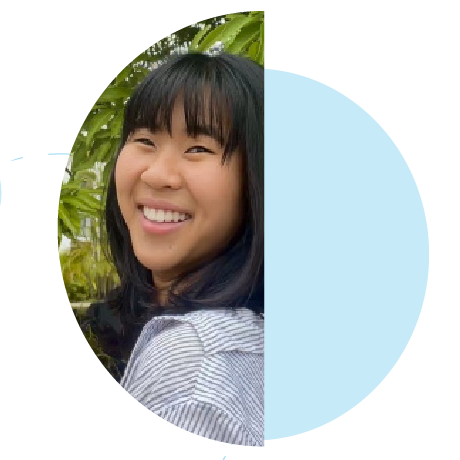
Tessa Baum, CAMD’24
“Scout, Northeastern’s student-led design studio, has been by far the best part of my college career. In past years, Giving Day has allowed Scout to create new teams; develop our annual conference, ‘Interventions; host speaker series that connect students with design professionals; and grow by more than 40 members. Your support will open doors for Scout’s students and allow us to build the future of student-led design initiatives.”
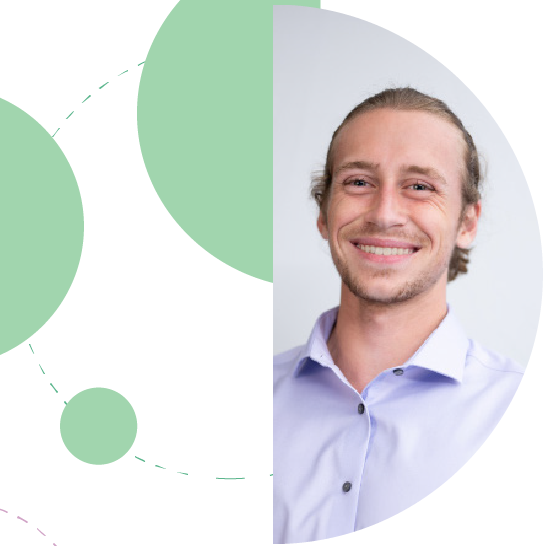
Dallon Archibald, Khoury’25
“Gifts from Giving Day are an indispensable asset for making Men’s Club Ultimate accessible and competitive at a national level. We host three teams, combining over 100 players and coaching staff, so we rely extensively on donor support. We are so grateful for the continued support from our donors. Your generosity and passion allow us to pursue the sport we all love!”
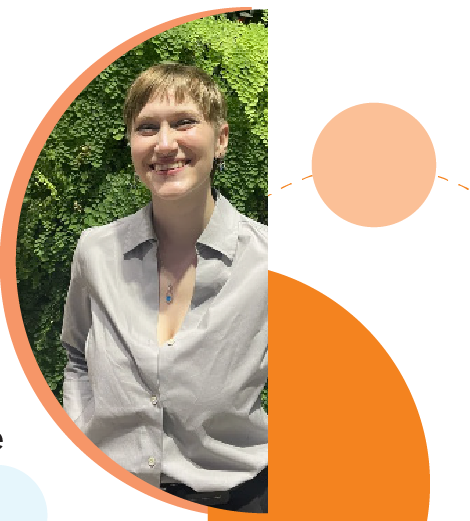
CJ Huey, E’24
“In 2023, Giving Day donations made the difference that allowed the AerospaceNU club to travel to the Mojave Desert to launch a test rocket. Our club relies on donor support to help our members partake in experiences they may never have otherwise, from research trips and drone competitions to conferences and testing rockets across the country. I cannot thank our Giving Day donors enough!”
The Giving Day site is now live! As a member of our faculty and staff community, show your support for the next generation of Northeastern changemakers. Your generosity will help students pursue their ambitions and fund the opportunities that will shape their university experience.
Student-powered research helps small businesses access opportunity
The Northeastern Lab for Inclusive Entrepreneurship just launched a dynamic, online, on-demand module for small companies interested in how to do business with colleges and universities. This interactive module was designed as part of a capstone project by Egle Slezas, who graduated from the instructional design master’s program in December 2023.
This module aims to solve the frustration many businesses face, especially small businesses, when trying to become an approved vendor for complex, multifaceted organizations such as higher ed. Businesses led and owned by historically marginalized communities face particularly daunting challenges, and this module aims to demystify the process and create more opportunity for small businesses.

The mission of lab for inclusive entrepreneurship is to contribute to economic development and community resilience by promoting inclusive, equitable innovation and entrepreneurship and assisting small businesses address their technical and managerial challenges.
As a University Center designated by the U.S. Economic Development Administration, this lab helps small businesses, particularly ones in the Portland-Boston-Providence Corridor, through two major initiatives:
- The Inclusive Entrepreneur Fellowship program
- Business assistance in the form of project-based collaboration with teams of Northeastern students
In addition, a major multi-year grant from the Ewing Marion Kauffman Foundation supports the lab’s research and educational programs promoting supplier diversity in higher education.
The work we do is vital for removing barriers to opportunity for diverse businesses, it’s especially inspiring to witness the impact of our students as they engage in transforming the future of both academic research and business.
Francesca Grippa, Professor of Business Innovation, Associate Dean of Research, and Executive Director of the Lab
Because the lab’s work is grounded in applied research in such areas as economic development, digital technologies, and supply chain management combined with hands-on learning and community-based partnerships, it can provide diverse small business owners with the practical skills and supportive networks that drive growth while also serving innovation and opportunity for learners.
The Meaning of Scholarship
Scholarship: – “A grant or payment made to support a student’s education, awarded on the basis of academic or other achievement.”
– “Academic study or achievement; learning of a high level.”
Sandy Slotnik, Northeastern CPS Alumna, resides in Miami. Her connection to Northeastern’s College of Professional Studies is generational. And now, she’s giving back.
Slotnik’s father, Charlie Kesselman, grew up in a working-class family that spoke mostly Yiddish, some Russian and little English. He was one of seven children, including a blind sister and another diagnosed with Multiple Sclerosis. At a young age, he felt compelled to help his family. Slotnik said, “I remember my father telling me that he wanted to get a college education to better himself and also to provide for the family, so he attended Northeastern University in the [19]20’s.”
After her father passed away, Slotnik discovered that he had continually donated to Northeastern University his whole life. “It probably wasn’t much because they weren’t wealthy, but he always gave back.” she said.
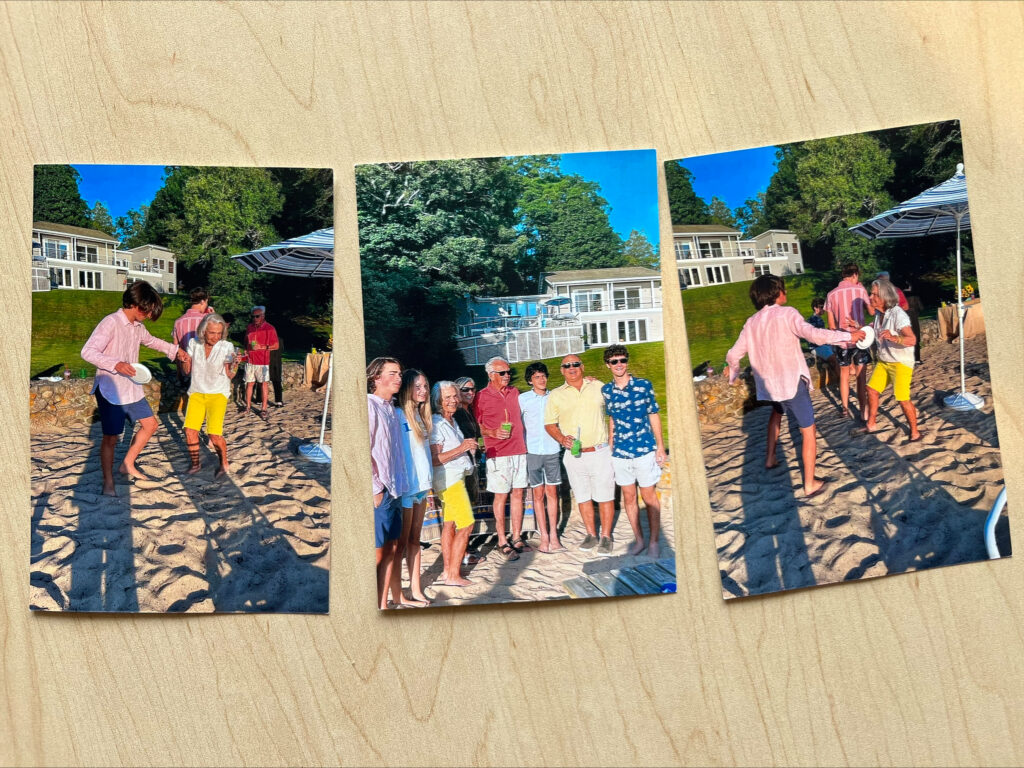
Her mother, Frances, was from a more privileged Jewish family. Frances was the only girl in a family of four children. Her brothers were given the opportunity to attend college, but because women were often discouraged to pursue academic achievement at that time, she wasn’t extended the same opportunity. Nevertheless, Frances was keen to establish herself and so she enrolled in secretarial school where she learned basic shorthand and typing skills.
While her mother worked as a secretary, her unrequited academic aspirations lingered and her reverence for higher education remained intact. She became active in the Women’s Scholarship Association, a progressive organization that raised money for women who wanted to go to college but could not afford it. Slotnik recalls, “My mother was passionate about that organization and active for a long time. Growing up with that, I always knew I would attend college. It’s amazing how deeply our lives are influenced consciously and unconsciously by our environment.”
Defining a Scholar
Scholarship, according to Slotnik, is about more than just giving money. It is an aspirational identity. “When I think of the word ‘scholar’ I think of someone who is educated and smart. I have always wanted to be well-educated, but I never thought I was smart enough. I had trouble reading and concentrating, and I always felt distracted.”
Slotnik’s own school days were complicated. Despite being equipped with both a strong work ethic and deep philanthropic passion passed on by her parents, her brain and its capacity to learn through traditional academic methods didn’t quite cooperate.
I knew I had this problem, but my parents didn’t fully recognize it. At some point in high school, I was given a timed SAT test – I had difficulty finishing anything on time – although I was getting good marks my senior year in high school I had difficulty with comprehension and I couldn’t retain information, so yes, I had trouble.
Despite her challenges, Slotnik graduated high school in 1957. Her sister went to Bennington College in Vermont and, she said, “I thought I was supposed to follow in her footsteps; she was beautiful, popular and smart, and I wasn’t any of these things. I knew that I had to make my own footprint but I wound up following my sister to Bennington. And that was where life changed for me a great deal.”
College was difficult for Slotnik. By December 1960, her senior year, the college said Slotnik wasn’t fulfilling capabilities and they asked her to take leave and see a doctor for some learning difficulties that a few of the professors had observed. “It might sound like I got kicked out, but it really was a turning point in my life. They basically gave me a second chance because they told me that if I took leave and took the time to look at my challenges to try to find a different approach, I could come back.” she said.
“I’m actually proud of it all. Diagnosing something like a learning disability in the early 1960’s is special.”
– Slotnik
It wasn’t until 1968 when the second edition of the Diagnostic and Statistical Manual of Mental Disorders (DSM), the handbook used by health care professionals in the U.S. and much of the world as an authoritative psychiatric diagnostic tool, was published that a disorder resembling Attention Deficit Hyperactive Disorder (ADHD) was recognized.
Unfortunately for Slotnik, she was right behind this curve. But because her professors at Bennington were avant-garde enough to recognize the difficulties she was having in class, she was able to take the necessary time to recalibrate. By her senior year, Bennington allowed Slotnik to return, and they assigned a counselor that she met with weekly. “The counselor was a sculptor, and he was so caring and supportive of whatever work I decided to do, he encouraged me and left a lasting impression to this day.”
Slotnik successfully graduated in 1962 with a bachelor of arts as an art major. After college, she returned to Brookline and took a few jobs but then decided she wanted to fulfil her childhood dream of becoming a teacher. That’s when Slotnik decided to go to Northeastern University’s night school (now the College of Professional Studies). Her parents said they wouldn’t pay for it, so she paid for it herself. “It was kind of a blur but I did it. I worked by day, lived at home and studied at night. I couldn’t afford an apartment doing everything else. It was hard.”
Around this same time, Slotnik met Joe, her now husband of 60 years. She said, “As a woman, I was a victim of my generation. So, when I knew I was going to get married, I said ‘I don’t need this graduate education anymore, I’ve got a guy.’ But my husband looked at me and said, ‘you’re going to finish that course and take that final exam!’ And I did. He encouraged me to be myself.” she said. While she didn’t complete her graduate degree straight away, pausing when she had her first child, she returned to Northeastern University in the 70s after about a ten-year hiatus.
“This is another thing I respect about Northeastern University – they were willing to take me back and accept all of my credits.” she said. Slotnik earned her graduate degree from Northeastern School of Education in 1973.
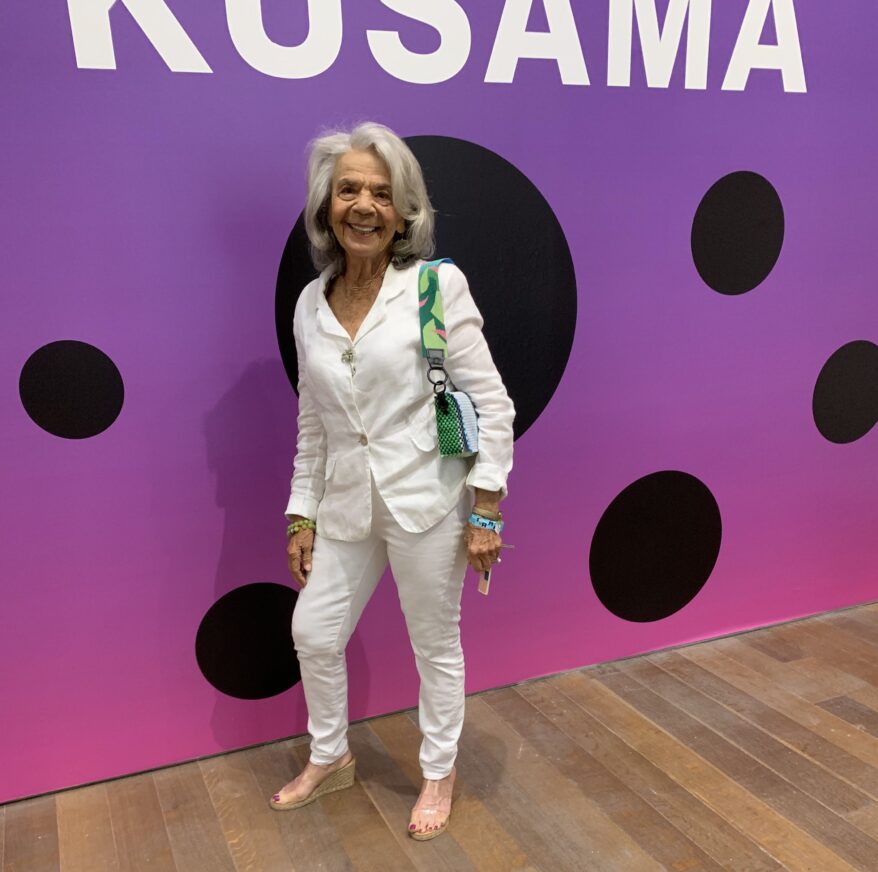
“I remember so vividly, I took a streetcar to the graduation ceremony, and when they gave me that diploma, they not only congratulated me, they spoke to me as an individual. The dean at the podium said ‘You’ve done great, come back and do a doctorate.”
That recognition and encouragement gave Slotnik a sense of confidence and made her feel capable of doing more, and that feeling stayed with her. She said, “That’s something I’ve noted about Northeastern all around. While I’m over here thinking I’m just ordinary, they are recognizing the unique parts of me and helping me see my best self! I got the message loud and clear: You can have setbacks but you can also move forward. Eventually.”
Slotnik then started to volunteer in the public schools, and one day the principal of the local public school said that the art teacher dropped out and asked if she could teach. “I was petrified but I grabbed the opportunity.”
Slotnik enjoyed her time as an Art teacher during the 70’s, and 80’s. Eventually, she moved on to help in the math department. As her own kids grew older, and her husband’s career took a different turn, they thought about trying something different. Her husband suggested they move to Florida. When the couple relocated, Slotnik initially commuted back and forth to Massachusetts to continue to work as a teacher. Shortly after settling in their new home, she became involved in volunteering for local art museums. The teaching gig faded and Slotnik enjoyed the next years building deep relationships and doing volunteer work with art museums in Florida. The museum was affiliated with Florida International University, a state university that focuses on providing opportunities to underserved applicants.
Reconnecting with Northeastern
Now equipped to actualize her life and continue to contribute to her community, Slotnik’s Northeastern experience seemed to fall in the rearview. Then in 2021, Slotnik’s daughter, Julie, scouted the Northeastern University campus with her teenage children. Knowing that her mother was an alumn, she left Slotnik’s contact details at the admissions department. Tara Esfahanian, CPS Director of Development, reached out and that’s when Slotnik joined the CPS Scholarship Committee, a committee that reviews applications for scholarships on behalf of the college. The Committee reads applications of underserved candidates who apply for help in their studies and makes funding recommendations.
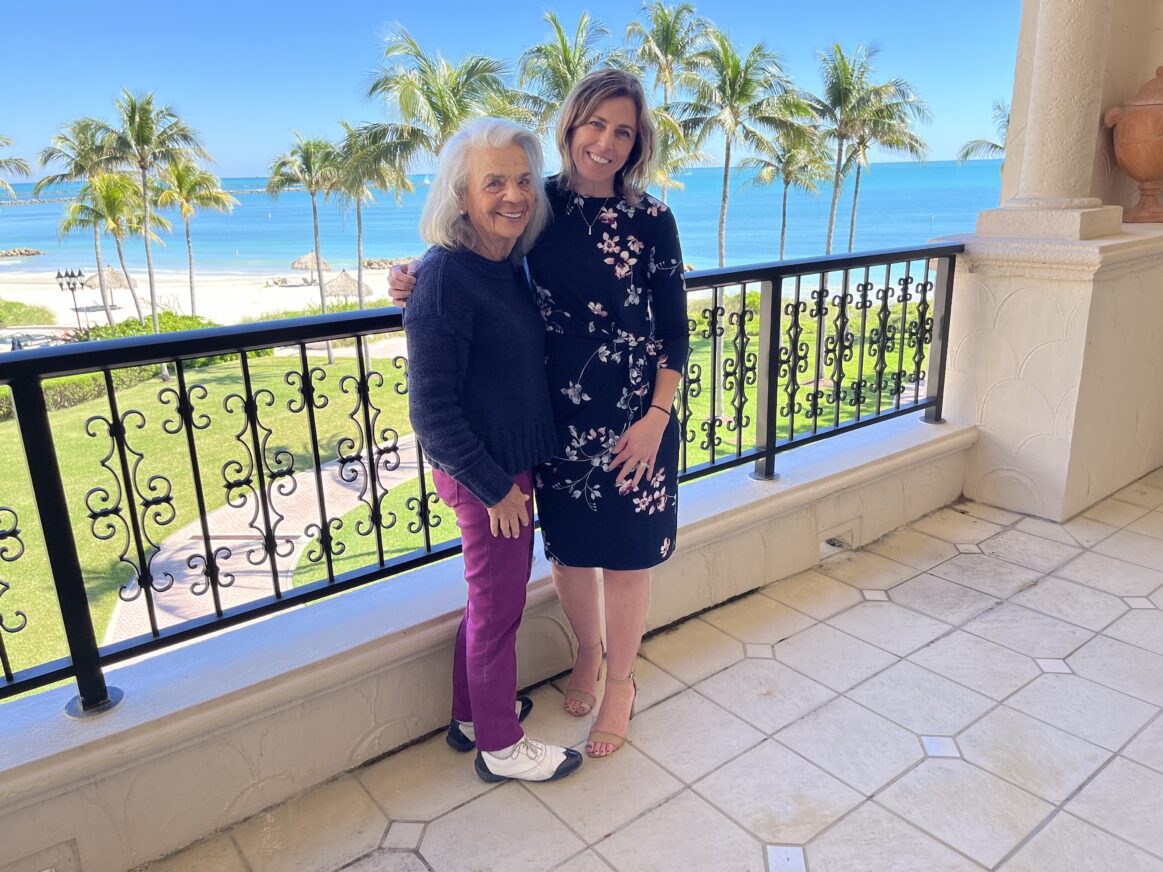
“Tara and I wound up connecting in Miami on a visit in January 2022. I invited her over and we chatted. We had lunch and she was fabulous. I was so honored and privileged that she even asked me to be part of the committee.”
Sandy’s own educational journey at Bennington and Northeastern, offers a familiarity with the non-linearity of many individual learning paths at CPS. Esfahanian, recognizing that this understanding is critical when evaluating scholarship candidates who may have faced challenges or disruptions in their own education, led her to believe that Slotnik was a perfect fit.
Esfahanian said, “I quickly knew that she would be a welcomed addition to the CPS Undergraduate Scholarship Committee. Sandy approaches the work on the committee with an understanding of selecting scholarship recipients who not only demonstrate academic excellence but also embody the resilience and determination needed to navigate life’s twists and turns. She has a spark for life and a passion for helping others, and she’s been there herself. Her vibrant personality, grit, passion, and drive are all traits that resonate in so many of our current CPS Students.”
“This all takes me back to my father. Reading these applications, how he fought for what he needed to do to take care of his family. They’re not just young, the applicants are like I was, they might have children, they are working and providing for their family, and they have a goal to make things better. And they don’t take things for granted.”
One of Slotnik’s grandchildren is a Junior in high school. “He’s looking at a lot of colleges and he told me he liked Northeastern University the best – he knew nothing about my or my father’s history there. Maybe he likes it for the same reasons that attracted my father and myself.”
Ultimately, Slotnik and her husband have decided to put their own money behind the scholarship initiative.
“I have many luxuries in my life and I do want to give back. That’s the message that I’ve learned. I have been fortunate that I have been given something from my education and it’s a privilege. I have been privileged.”
Slotnik, who turns 85 this year, was the first person in her family to go to graduate school. “I did make my own mark, my own footprint. We all have memories, and we all have dreams, and one of my dreams is to develop a scholarship for students at Northeastern. Throughout my life I have seen that its important for people to have things that other people can’t take away; like education. I want to give something to someone that nobody else can take from them. It also means that I still have a dream, a dream to give back.”
A “College of Access”
“What we are essentially doing is incorporating a value for lifelong learning,” explains Erin Clair, Associate Dean of Undergraduate Programs. “This is a story of empowerment, because not all students are going to have a linear path and access to opportunity.”
Northeastern University’s College of Professional Studies (CPS) helps nontraditional learners achieve higher levels of education that open professional doors. This work is deeply rooted in the University’s founding principles of urban engagement and experiential learning and is set to have a ripple effect for individual communities and national workforce development goals.
“This is the ‘access mission of CPS’. Our purpose is clear, regardless of the jargon: we are creating access however we can. It’s a Robinhood-type story, its mission driven, and it’s why I’m here,”
– Erin Clair
CPS Executive Director of Marketing and Communications, Joe Brock, said, “Dating back to the founding of CPS’ (formerly known as University College), we have provided opportunities for working adults to complete their bachelor’s degree, meeting them where they are with educational excellence, and flexibility to enable their educational goals. This hasn’t changed over the years as we continue to expand and grow our partnerships with community colleges and organizations that focus on access for underrepresented communities.”
The college has amassed over 40 partnerships with community colleges across the country. Most are articulation agreements, which maximize credit transfer into Northeastern University and count towards a higher degree. But some of the partnerships exemplify more resourced options, include Middlesex Community College, Roxbury Community College, and Miami Dade Community College, where each comes with either public grants or philanthropic sources for scholarship and provides additional resources for students. This, coupled with the University’s unique placement as the number one University in coop experience [as listed by US News], becomes a compelling offering.
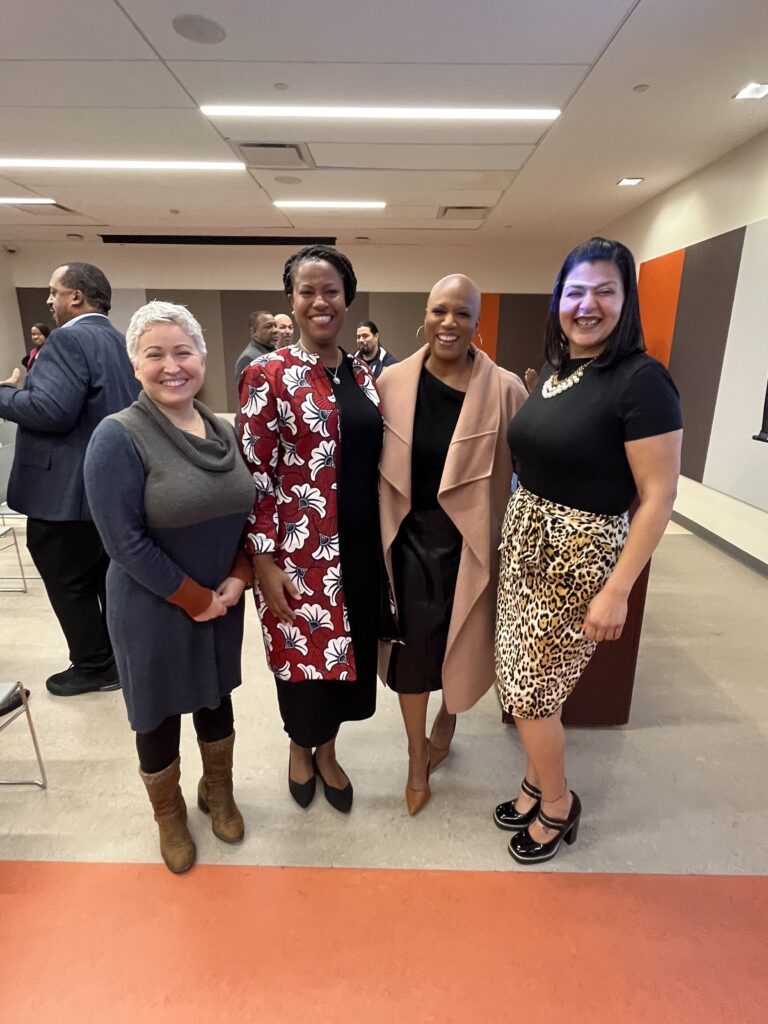
Clair’s team is responsible for the entire program that creates these partnerships, which began in 2017 when Liz Zuilick, formerly CPS Associate Dean of Undergraduate Programs and now Vice Chancellor of Strategic Planning & Projects, spearheaded a partnership between CPS and Middlesex Community College (MCC). The partnership, which is currently in its fifth and final year, received a $4.4 million-dollar grant from the National Science Foundation (NSF) to award scholarships to low-income and under-represented minority students in biotechnology who participate in an accelerated Associates to Masters’ Degree Program, known as “A2M.”
As an example of impact, in 2021-2022, the partnership with MCC served 40 students at the Associate’s level, 48 at the Bachelor’s level, and 14 at the Master’s level, with 92 distinct students. A total of 34 students graduated from one of these degree programs within the calendar year.
In 2020, Northeastern University’s President Joseph E. Aoun established the ‘Experience Unleashed’ strategic vision, which committed the University to a mission of equitable access across its global campus network. Part of this effort, known as the ‘Impact Engine’ initiative, formally adopted the A2M bachelor’s completion program as an approach to meeting its goal of ‘making the world a better, more equitable place through access to higher education’.
The University is currently working on replicating the approach at a faster pace throughout its global campus network, focusing on partnering with community colleges that are located in proximity to Northeastern campus locations. The hope is that many of these partnerships will grow to attract additional resources that will benefit students.
As testament to the college’s agility in making higher education accessible beyond barriers, the approach has taken many forms – A2M, eA2M, PlusOnes, and Pathways are all common names associated with it. The overarching focus is the same: to provide a “bachelor, and beyond, completion initiative” aimed to equip learners with whatever it takes to provide them with professional opportunities, while simultaneously removing barriers to higher education.
Who’s Behind the Effort
“Through the eA2M Model, we plan to reach learners in the regions surrounding our global campus sites. In addition to experiential opportunities, we offer funding support, support with childcare, and 1:1 student coaching that will help students navigate the complexities of college learning!” said Chris Cook, Director of Impact Engine, Professional Programs, who works to grow partnerships through what is referred to as the Experiential Associates to Masters (eA2M) model.
“We strategically align our programming to be in fields where there is high demand and pathways to economic viability. We know there is significant underrepresentation in high skill, high paying jobs, we intend to support incredible learners to develop those skills and access those jobs! This objective is tied to national workforce development and that approach is championed by Northeastern.”
– Chris Cook
Oftentimes, the students who are taking advantage of these partnerships are first generation college students, the first ones in their family to attend college or university.
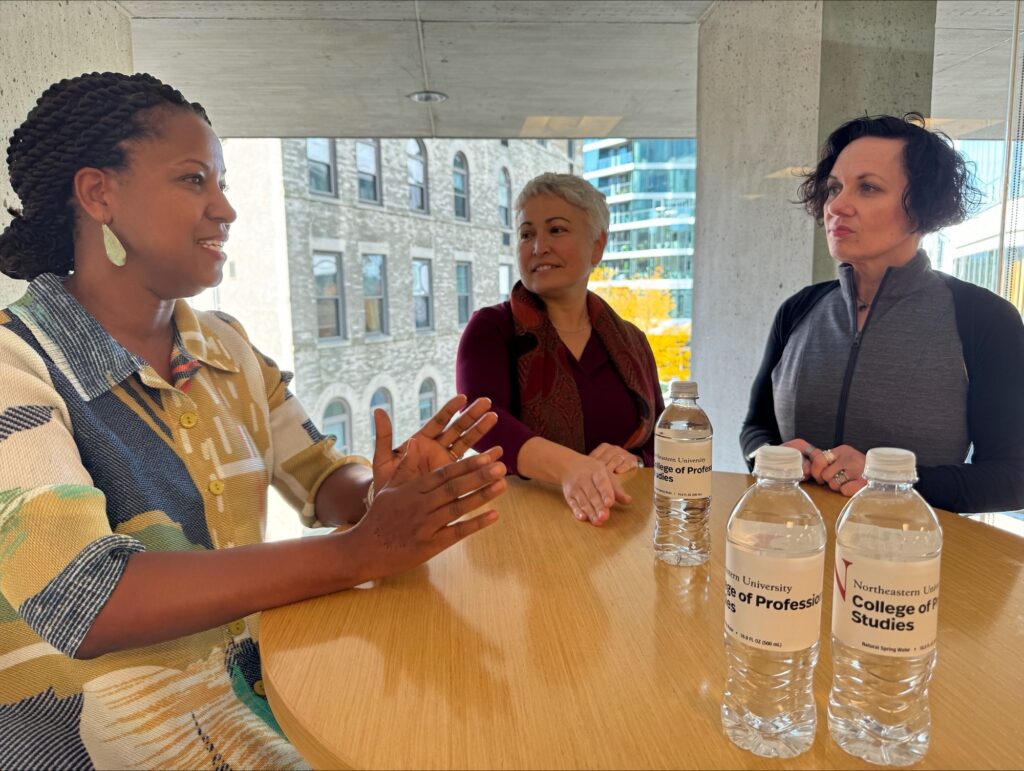
“When you are the first person in your family to pursue a college degree, you do not necessarily have access to information on how to best navigate a complex college system.”
– Earlene Avalon, Associate Teaching Professor and Director of the Lowell Institute School, who recently helped launch CPS’s newest Bachelor completion partnership with Roxbury Community College.
The partnership is supported by the $1M Federal grant awarded to the application that Avalon co-wrote with Francesca Grippa, Professor and Associate Dean of Research for CPS Undergraduate Programs. The provides 30-50 students scholarship opportunities in STEM related fields of healthcare, technology and biotech.
Avalon is herself a first-generation college grad who understands the barriers faced. “This can be a huge barrier, coupled with the fact that some students have to work full-time or are raising a family, all while pursuing their degree.” she said.
Each enriched partnership aims to be tailored to the socio demographic needs of the student body. In the case of Miami Dade Community College, the partnership aims to provide childcare to accommodate the need voiced by the prospective student body, many of whom are young mothers trying to gain professional opportunities through higher education. Wherever possible, the partnerships are funded by a third party like a state or federal grant that supports workforce development.
“This work is about building a pathway to prosperity not just for students, but also prosperity for the country because of this talented workforce that we know nothing about,” said Deb Jencunas, one of many CPS change agents at the helm of forging these community partnerships. As Director of Pathway Partnerships, Jencunas primarily works to build partnerships that support bachelor completion programs.
“Because they lack access to finance, they haven’t had the opportunity to develop professionally beyond high school or have greatly struggled to do so. What would our world look like if access wasn’t a challenge? That’s why I do this.”
– Deb Jencunas
When asked why Northeastern University is so attractive to learners, Jencunas explains that CPS’s direct connection to industries and professional fields offer students an immediate benefit of a network.
Northeastern’s Alumni network is also actively supporting this model. CPS Director of Development Tara Esfahanian says, “Many of our donors are alumni, themselves once in the position of being first generation college graduates that were helped by this approach. They are usually eager and excited to give back in the same way they were given to.”
The Navigator
One of the most unique aspects of the funded partnership model is in the form of direct support from student academic support coaches called ‘CPS Navigators’, whose role is to walk each student through the process of onboarding into a program at Northeastern University.
Mary McCarthy, CPS Director of Strategic Partnership of Funds, seeks to activate philanthropic support from a variety of sources including federal monies, community college partnerships, corporate and foundations sponsorships, and the tremendous generosity of alumni and friends, to enable students to enter and excel in higher education.
“That support can come in many forms including endowed or current-use scholarship awards, in addition to wrap-around services that provide students with textbooks, laptops, and personnel support in the form of the Navigator role. A Navigator is a CPS employee whose responsibility is to partner with students to help them navigate the unique complexities of higher ed administration. CPS is pleased to have spearheaded this model for success, wherein A2M students have a steadfast ally in navigating the various hurdles of admissions, enrollment, matriculation, and degree completion. In different cities, student experience unique region-specific needs. The Navigator can be particularly useful in diagnosing the nuanced needs of a given region, allowing us to successfully clear those unique hurdles. While I have only been at Northeastern a short time, in my 26 years in Higher Education I have never witnessed a more robust and generous student support infrastructure.”
– Mary McCarthy
Tahir Abbas is the Navigator for the MCC A2M Program Biotech who facilitates student transitions from Middlesex Community College into Northeastern University. His office is located within MCC and students can drop by to visit him.
Visibility is really important, by having this office and being located at the community college, we are demonstrating how committed and accessible the program really is.”
– Tahir Abbas
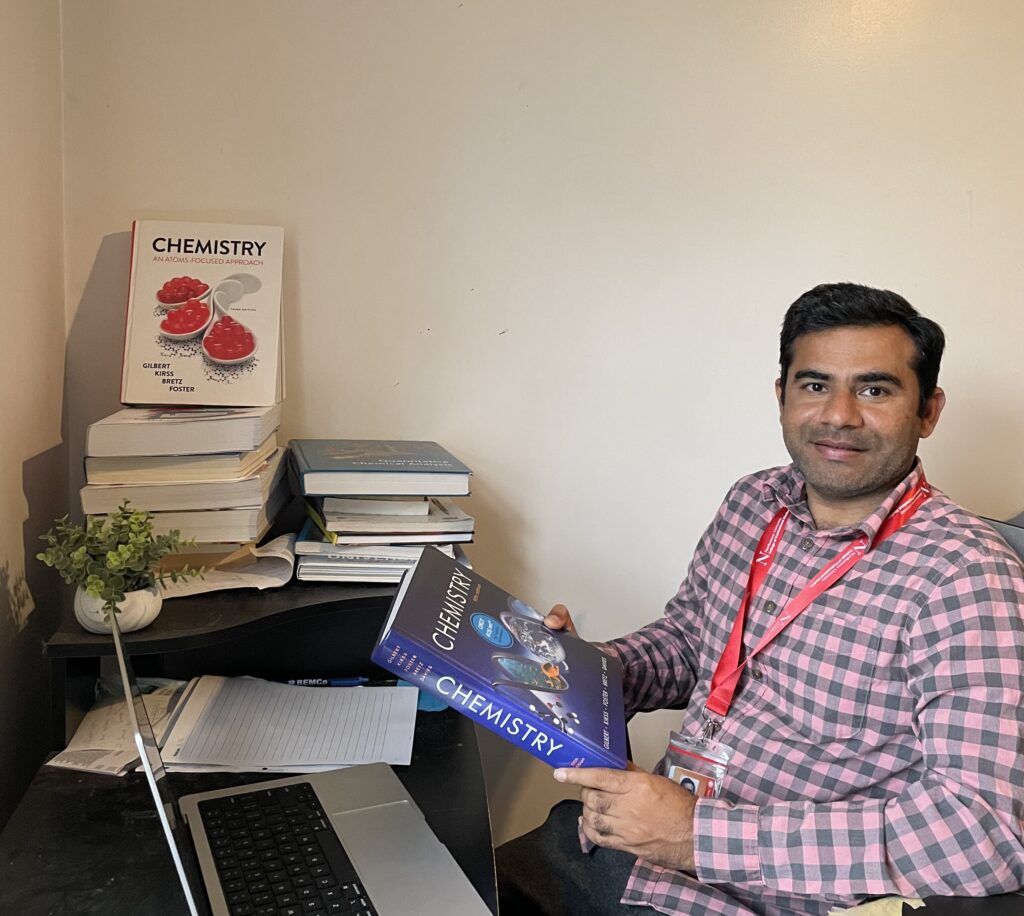
Abbas helps at every stage of the process, from the application process all the way to placing them in a job internship and anything else in between, including aligning the student with financial assistance, helping with funding tuition, textbooks, or parking passes. Tahir also helps students determine their eligibility for financial support. For example, the MCC Tech program provides students with $5k per semester with a maximum cap of $10k per year. The typical out-of-pocket cost to students is $2-3k per semester. Sometimes, Tahir will work to find alternative funding sources to cover even that.
The navigator role is a major factor in the success of the whole approach. The value lies in specialized attention tailored to the needs of each student.
“If a student comes to me, I never send them away. Universities have complex financial aid and enrollment systems, but if students come to me, I help them figure that out. Once they trust me, they begin to believe they can accomplish bigger goals with this sort of support behind them.”
– Tahir Abbas
Abbas related that the hardest part of the job can be quite labor intensive: delivering textbooks. “Sometimes our students are single parents, or pregnant, so I deliver to the house. And I don’t mind because it helps, and I like that.” Abbas continues, “The students are supposed to return those books at the end of the semester. In December, I will drive again to collect them!”
It’s all in a day’s work for the CPS team that is helping students achieve goals they never knew were possible.
Snell Library Tour for CPS Students
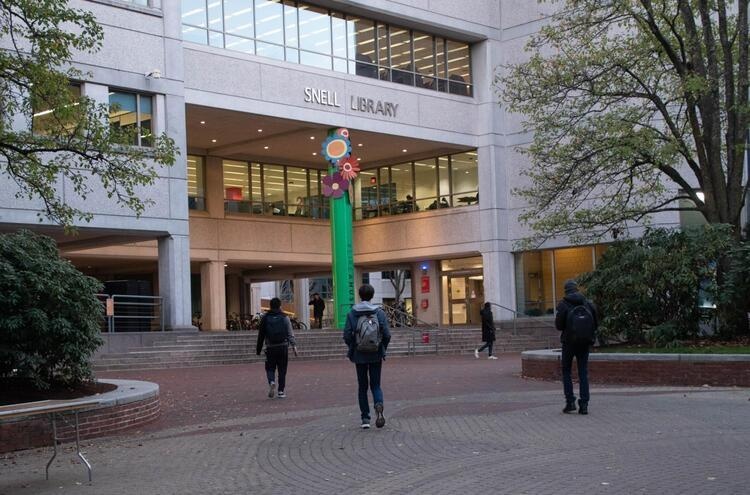
Meet CPS Librarian Anaya Jones outside Snell’s temporary entrance on the west side of the building for an up-close and personal tour of the library! Please complete this registration form so we know you’re coming. Thank you!
The Student Perspective: The shock and confusion that comes with being new to America
Oishika Hota, MS Media Innovation and Data Communication, class of 2024 Graduate, talks about her experience as an International student
One of the great privileges I have been offered is that of exposure. Starting from school all the way to graduate school here at Northeastern, every step I have taken has expanded my world significantly. But nothing has done the job like moving my life halfway across the globe.
Coming from Mumbai, Maharashtra, the most populous city in India, a land known for its vast array of cultures, languages, and traditions, I thought I had seen it all. However, the U.S. presented an even more intricate mosaic of backgrounds, beliefs, and practices. In India, a fusion of varied traditions and customs maintains its quintessential Indian identity despite the diversity. On the other hand, the US displays an intricate mosaic, presenting influences from diverse corners of the globe, resulting in a distinctive cultural mix. I feel like I am part of a melting pot, and navigating this diverse tapestry is one of my favorite challenges as an International Student in America.
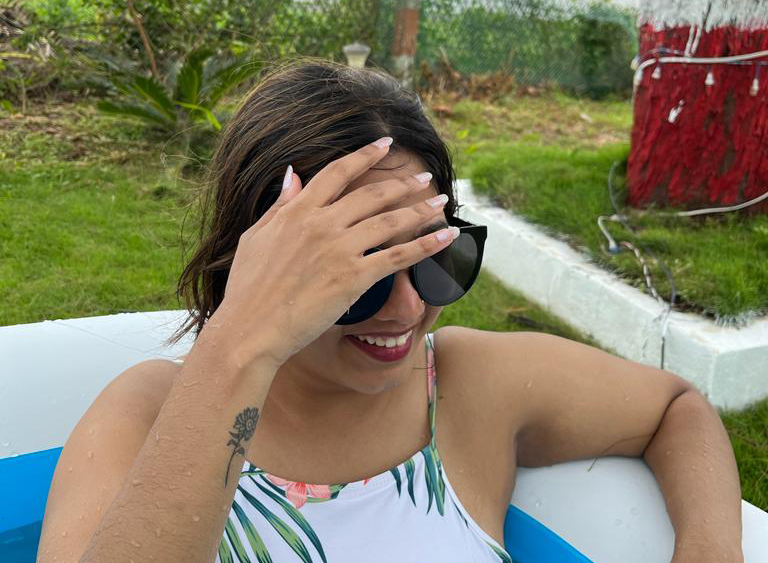
“There is a difference between knowing something and actually experiencing it.”
Oishika Hota
Whatever I knew about the U.S. before landing here was from my consumption of American pop culture. As a fan of chick flicks, Legally Blonde and Pitch Perfect shaped the way I perceived the American Collegiate experience. Apart from that, I had also watched enough TV shows and movies to anticipate a lot of what was thrown at me: the small talk, the food, and the cold weather. When Mindy Kaling made New York winters seem warm compared to Boston in “The Mindy Project,” I knew I had to be prepared. But there is a difference between knowing something and actually experiencing it.
For all the small talk America offers, I had a lot of trouble making friends — especially as a graduate school student, where forming a community in a class full of people from several countries is, to put it simply, hard. Overcoming these challenges required me to step out of my comfort zone. I began attending social events organized by the university and joining clubs related to my interests. It was nerve-wracking at first, but I pushed myself to strike up conversations, even if it meant starting with a simple “hello.”
I’m not a hater of American food, but there are a few dishes that just don’t hit the mark for me. Especially when they’re missing that spicy, flavor-packed kick that Indian dishes usually bring to the table!
While ingredients and restaurants can be found in Boston, the cost of materials and lack of variety ends up killing the taste. Even though I have learned how to cook, nothing beats the taste of food cooked in your actual home.
The cold, again, was something I was mentally prepared for, but coming from a tropical country, acclimatization did not come easy. I could finish bottles of moisturizers, but I did not understand why my skin was still dry, why I was still feeling cold after wearing my thickest jacket, which brand would protect me the best, and why it was so dark at 4:30 p.m. Despite the struggle, I found ways to keep pushing through. You find little moments of joy, like a warm cup of hot chocolate, a cozy night in with your favorite food and a movie.
With practice, my problems have changed. I feel better prepared for my second winter here, I am ready for the lull and sadness that comes with the darkness. It’s about acknowledging that this period is difficult, allowing yourself to feel it, and seeking support when needed. Whether it’s talking to a friend or a professional, sharing the burden of these winter blues can make a world of difference.
But at the end of all this, the hardest shock hasn’t been cultural, but that of the magnitude of my homesickness. Being far away from the close-knit family and the familiar comfort of home is a struggle. Learning to adapt to a new culture is by far not an easy task. The difficulty is what has sparked resilience in me and pushed me to explore this new landscape; to develop a new support system despite the cultural and the often not-so-edible reminders that I am in a country that is not mine.
“Whether it’s talking to a friend or a professional, sharing the burden of these winter blues can make a world of difference.”
Oishika Hota

Moving away from home has been the hardest thing I’ve ever done. But it has also been one of the most enriching experiences of my life. It was a slow but rewarding process. As I opened up and made an effort to bridge the cultural gaps, the move didn’t seem so bad.
Looking back at the whirlwind of the last year, I’m giving myself a mental high-five. The hurdles and bumps were tough, but they’ve turned me into a stronger and wiser version of myself. And for that, I am immensely grateful.
Annual Scholarship Reception a Huge Success!
With over 225 students receiving upwards of $300,000 from 52 scholarships – there was much to celebrate at the College of Professional Studies’ annual Undergraduate Scholarship Reception.
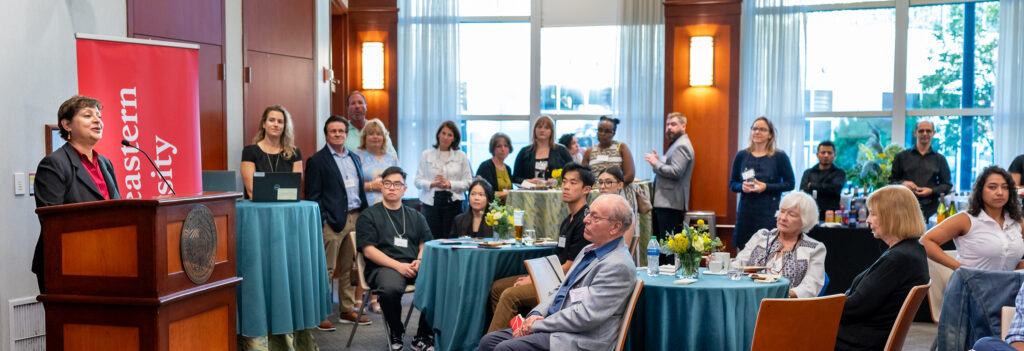
With the crackling anticipation of alumni donors eager to meet the recipients of their scholarship funds – and students so excited to greet and thank their benefactors all in attendance, the gathering has all the earmarks of a supportive community rooted in a legacy of achievement and of people helping people reach new heights.
The celebration included inspiring remarks from two benefactors, Mani Sundaram, MS’99 and Meena Ramakrishnan, CPS’06 who each offered compelling reflections on their experience supporting financial aid:
“Sponsoring six CPS students has been a source of immense gratification for us. We love the concept of creating a pathway for students and community colleges to gain the knowledge, skills, and credentials to align themselves with what’s going on in the industry, secure excellent jobs and build strong career trajectories.”
Mani Sundaram. MS’99
“We felt it was the right opportunity to do our part because we had been given challenges back then so both of us are delighted to be part of this program and we wish all the students here all the very best in your lives.”
Meena Ramakrishnan CPS’06
Mohamed Abougalala, Information Technology, Class of 2024 rounded out the program with a personal account of his journey to CPS from Egypt. Mohamed shared his experience arriving at CPS, saying, “The moment I stepped onto campus, I felt a sense of belonging.”
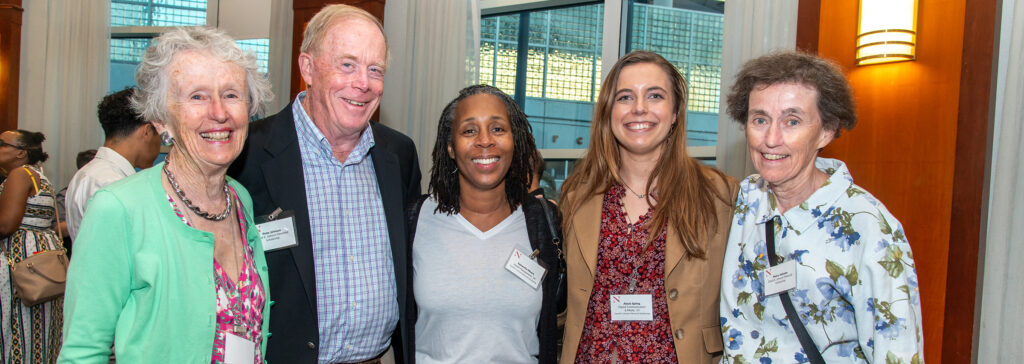
Whether a student, alumnus, donor benefactor, staff member, academic advisor, or faculty member – the annual Scholarship Reception fills the tank on good vibes with warmth and an expansive sense of the goodness and remarkable capacity of the College of Professional Studies to positively impact lives, to advance opportunity, and to building a community rooted in a culture of giving back.
If you have any questions about the undergraduate scholarship program at the College of Professional Studies, please contact Mary McCarthy, Director of Strategic Partnerships and Funds, at [email protected].
View photos from the event here.
Beyond the classroom
Discover How Three Dedicated CPS Professors Empower Underrepresented Entrepreneurs
In 2021, visionary CPS professors Francesca Grippa, Youngbok Ryu, and Carl Zangerl leaped at the opportunity to further the College’s founding principles: meeting Learners where they are and going beyond the classroom to deliver opportunities.
After the country found itself in a second civil rights wave in 2020, politicians and public leaders scrambled to produce fiscal resources to eliminate race-based discrimination and level the economic playing field with a fervor not seen in over 60 years. Northeastern University’s College of Professional Studies (CPS), a legacy champion of Diversity, Equity, and Inclusion well before it was trending, found itself in a position to receive external support for something it had always upheld.
Grippa, Zangerl, and Ryu were well-positioned and eager to take full advantage. Through their individual experiences teaching Learners and seeing the challenges they faced as they applied education to improve their lives and communities, the Professors each had their own understanding of where additional resource provision would prove beneficial.
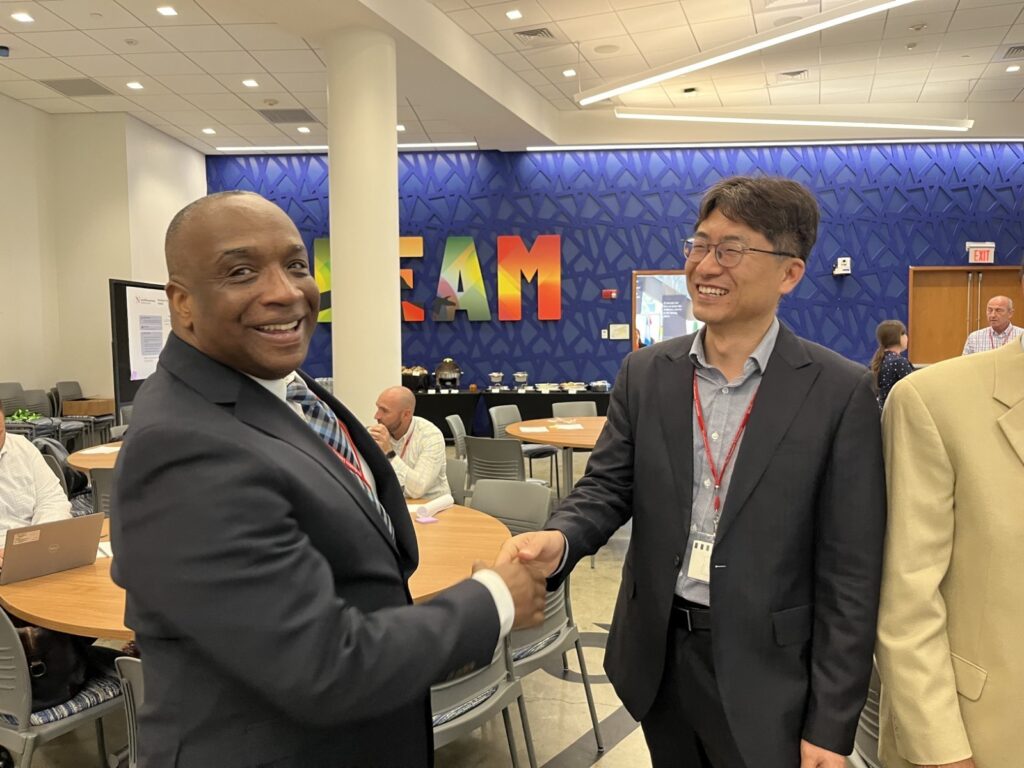
The US Economic Development Administration (EDA) and the Ewing Marion Kauffman Foundation both opened bids for a five-year and three-year grant opportunity to support diverse small businesses and after securing funding in 2021, thanks to these Professor’s passion for their work, The CPS Lab for Inclusive Entrepreneurship was born. Its sworn mission of ‘contributing to economic development and community resilience by promoting inclusive, equitable innovation and entrepreneurship and assisting small businesses in addressing their technical and managerial challenges’ laid the groundwork for a three-pronged service platform for small businesses; it included: the Inclusive Entrepreneur Fellowship Program, Technical and Managerial Assistance and Procurement Research on Supplier Diversity in higher education.
About the Lab:
The Lab assists both historically disadvantaged entrepreneurs whose business models are centered on giving back to their communities and businesses with strong missions to help disadvantaged communities. It largely provides small, minority-owned (Black, Brown, women, LGBTQ+, Indigenous) businesses in Maine, Massachusetts, and Rhode Island with resources they can use that to improve their business operations, evolve their business models, increase market reach, or tackle other challenges, and ultimately improve their communities.
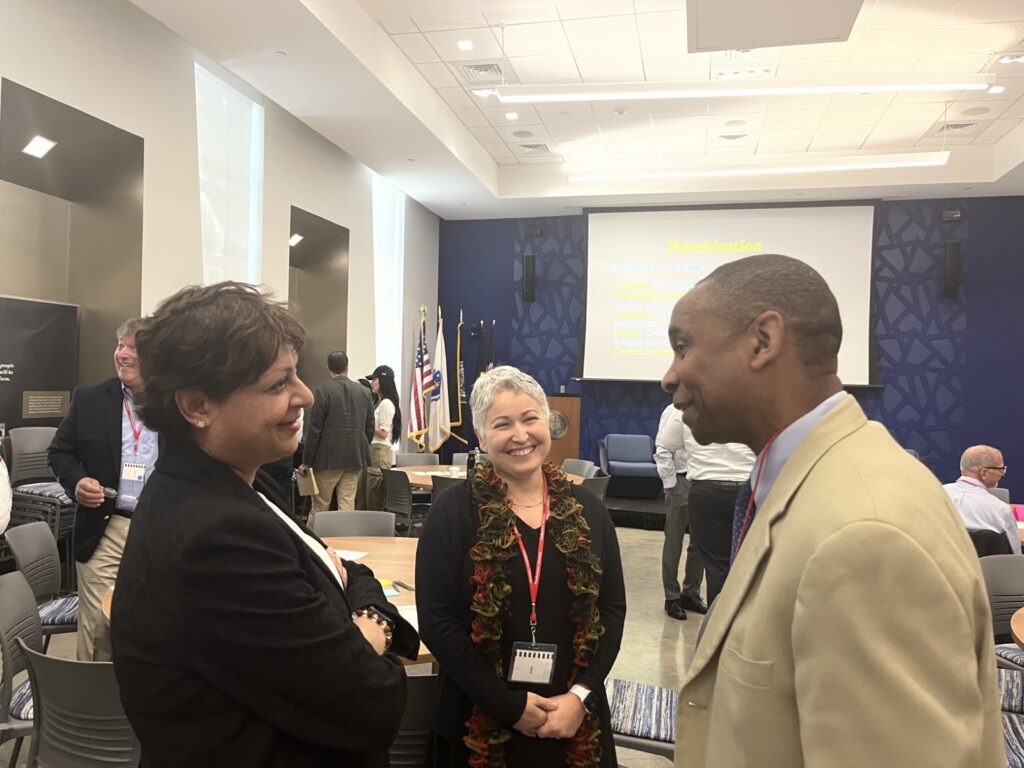
We asked how the Lab fits with CPS’s overall offering. Francesa Grippa, Executive Director of the Lab, said with her soft and rich Italian accent [she hails from Lecce, Italy], “Because we give opportunities to improve lives through learning; because we engage Learners in real business challenges to provide that experiential aspect; and because we care about inclusive prosperity beyond the classroom, we want to genuinely give Learners the tools to be successful, not just dole out diplomas and send them on their way. For us, going outside of the program model and reaching outside the classroom to support these Entrepreneurs is a perfect fit and exactly where we need to be.”
Inclusive Entrepreneur Fellowship Program & Technical/Managerial Assistance
The Fellowship Program hosts annual cohorts of small business owners – some of whom are existing CPS Learners or recent Alumni – who receive support, mentorship, and training to grow their venture, learn how to respond to RFPs, or negotiate contracts. Fellows have the opportunity to tap into Northeastern University’s vast entrepreneurial ecosystem including research centers and institutes, start-up labs, and potential funding resources. Qualifying applicants have to be in business for at least three years. The program is a la carte, not curriculum based, and true to the CPS mission of fostering the development of lifetime learners, focused on meeting Fellows where they’re at. Now in its second year, the current cohort is scheduled to graduate this September.
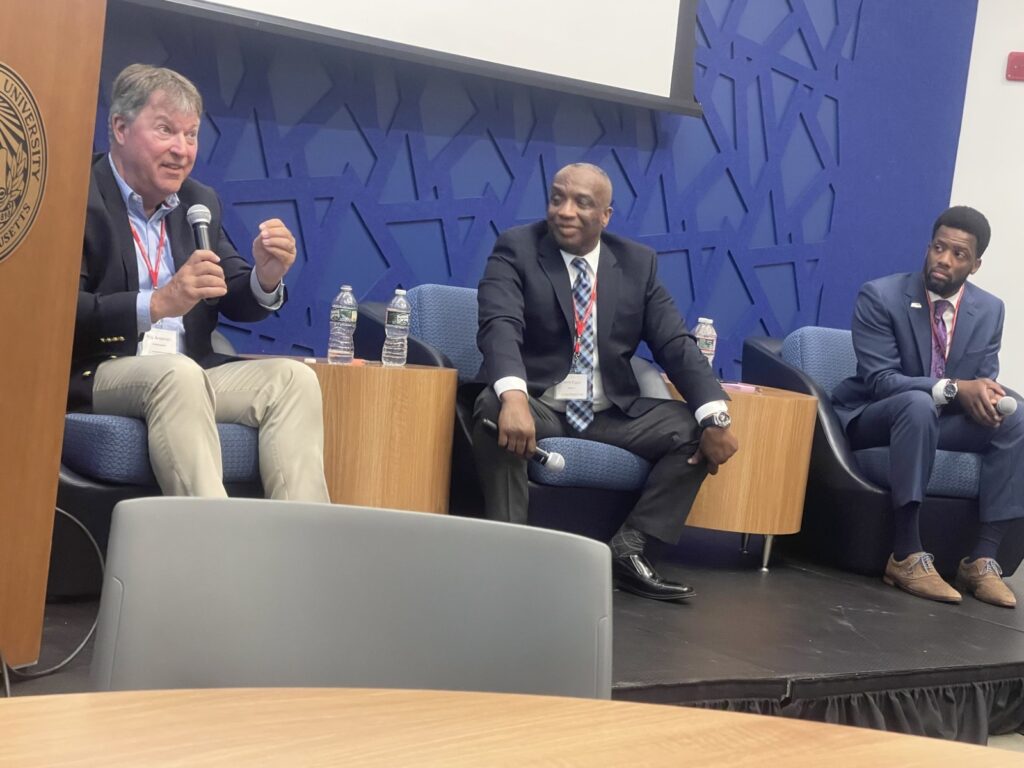
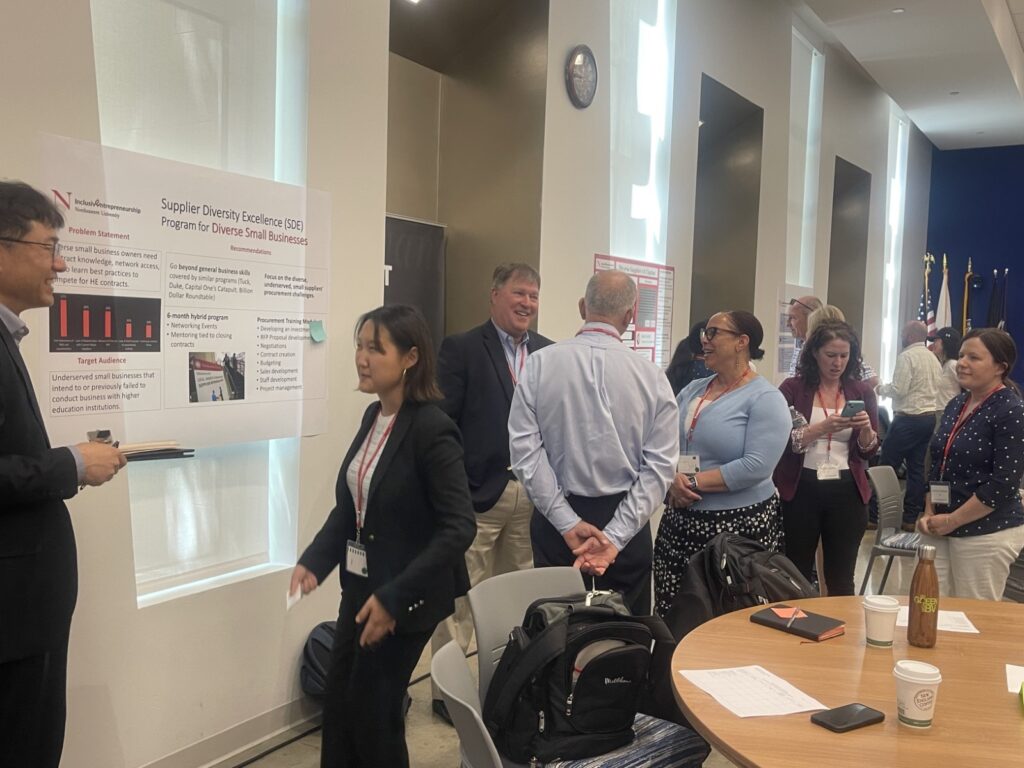
An entrepreneur’s experience
Fellow Alumni Gayl Crump Swaby has experienced first-hand what the Lab can do. She is president of the mental-health provider New Generation Consultants and as an experienced counselor with a master’s degree in social work from Boston University and an Ed.D. in child and youth studies from Nova Southeastern University, her expertise combines rigorous scholarship with years of real-world experience. Particularly in her work with children, Swaby says, “My purpose has become my passion.”
As an entrepreneur, however, she felt she still had a lot to learn.
“The business side of running a business was not something that was taught in school,” she says. “I didn’t have a lot of those skills and I wanted to get a deeper dive into looking at financials and business models. How do I finance it? Anything and everything related to managing a small business.”
At the Lab for Inclusive Entrepreneurship, she found exactly what she was looking for. Over the course of her fellowship, Swaby gained critical knowledge of negotiating contracts, setting fees, managing expenses, and working with subcontractors—all knowledge and skills she could apply directly and immediately to her professional life. She also learned strategies for increasing sales and practical techniques for boosting her leadership skills. Along the way, she earned the badges that now adorn her LinkedIn profile: Building Blocks of Strategy, The Finance of Funding, and Commercializing Your New Venture.
“The program helped me to really begin to scale my business up and think about what it means to be a small business owner,” Swaby says, “especially being a Woman of Color—and how difficult it is just getting access to resources and being able to break through barriers. The fellowship program helped me to think about not only not letting those barriers get in the way but the ways in which I can remove those barriers or get the support to remove those barriers.”
Supplier Diversity
The research arm of the Lab is a persistent powerhouse; its work is close to the heart of Youngbok Ryu, who leads the effort on Supplier Diversity. Census analysis projects that in 2045, the US will have a complete demographic shift, placing people who identify as white in the minority – this affects all sectors. “The Higher Ed sector represents billions of dollars of spending each year. Our hope is that Supplier Diversity can be one way to close a significant socio-economic gap,” Ryu says.
The research team has so far published two impactful reports on the subject.
The goal is to expand the Supplier Diversity research beyond New England and really engage not just owners of vendor companies, but also bring in the Procurement professionals who have the authority to implement institutional changes needed to remove internal barriers faced by smaller players, the same businesses that are most likely owned by Black, Brown or other minoritized people. The work in this area has the potential to be game-changing for the Higher Education sector and create an effective blueprint for how to implement this change.
Grippa notes that faculty across Northeastern have begun to recognize the program’s effects, and she is hopeful that momentum will continue to build for the Lab and the entrepreneurs and students it serves. She said, “Our efforts have been contagious, and we have been able to forge new alliances and collaborations that will help us to achieve even greater success in the future.”
Resources:
Learn more about the Lab for Inclusive Entrepreneurship: https://nl4ie.sites.northeastern.edu/ie2-fellowship/
Read the Supplier Diversity reports: https://nl4ie.sites.northeastern.edu/supplier-diversity/
Submit a request to the Lab for Business Assistance: https://nl4ie.sites.northeastern.edu/business-assistance/
Newsworthy mentions:
LAB on Boston Chamber of Commerce’s website: https://bostonchamber.com/thought-leadership/growing-into-larger-contracts-northeastern-and-drb/
Mass. colleges fall short of the goal to expand minority contracting: https://www.wgbh.org/news/education/2022/06/06/mass-colleges-fall-short-of-goal-to-expand-minority-contracting
2nd Annual Webinar on Supplier Diversity in Higher Education
The Northeastern Lab for Inclusive Entrepreneurship’s webinar on June 22 will highlight the preliminary findings of a survey of procurement professionals in higher education. How are they translating words of institutional commitment into action? What are the drivers of greater supplier diversity? And what steps can to be taken to sustain progress?
Joining us to share their perspectives are Nicole Obi, President and CEO of the Black Economic Council of Massachusetts, Jerry Epps, Director of Vendor Diversity at Babson College and member of the Lab’s Advisory Council, and Roy Anderson, lecturer and former VP of Global Procurement at MetLife.
To register for the webinar, click here.
CPS Student Awards Round-Up
The College of Professional Studies is proud to announce its students who’ve been recognized with a variety of prestigious university awards. These awards not only celebrate our learners for their extraordinary academic achievements but also for their commitment to the values and mission of Northeastern University. This year’s winners come from both our undergraduate and graduate programs and represent a diversity of majors, backgrounds, and continents. Congratulations to all our 2023 student award winners!

Huntington 100
Six students from CPS were inducted into the Huntington 100 for 2023. Sponsored by the Office of Student Life, the Huntington 100 recognizes students for their service, leadership, innovation and entrepreneurship, global engagement, and impact on the campus community. The award honors distinguished juniors and seniors from all Northeastern campuses for their achievements and embodying the university’s mission. These students represent what Northeastern is today – a selective institution with a global network, rigorous academic programs, experiential learning, and positive impact.
The following are the CPS learners who were inducted to the Huntington 100 on Tuesday, April 18:
- Rama Doddi, CPS’24
- Shakir Khalid, CPS’22
- John Ruggieri-Lam, CPS’23
- Hari Haran Sivaramakrishnan, CPS’22
- Azi Sohrabi, CPS’23
- Ryan Westmoreland, CPS’24
Compass Awards
We’d also like to congratulate CPS senior John Ruggieri-Lam, (pictured above with CPS Dean Radhika Seshan) who was also a winner of the Compass Award from the Northeastern University Alumni Association.
The Compass Awards program recognizes exemplary students from the senior class who have demonstrated a true dedication to a core set of values: leadership, volunteerism, academic integrity, and commitment to Northeastern.
Experiential Learning Award
The Experiential Learning Awards recognize outstanding students who have successfully integrated the classroom with real-world projects in three main categories: Co-op Excellence, XN Excellence, and Humanics. Students selected for these awards are nominated by their co-op employers, XN project sponsors, faculty, or staff. These learners have demonstrably gone above and beyond in their educational journeys through professional work, research, and service on seven continents — learning how to transform ideas into impact and become global citizens with successful careers.
Experiential Learning Group Award (Group)
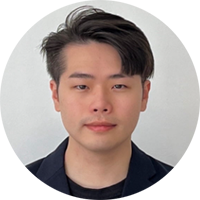
Jong-Kai Lee
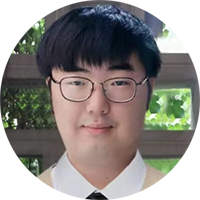
Yinkai Wang
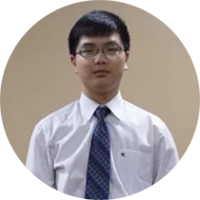
Hao Shen
Course/Co-op: Informatics Capstone Project
About the Project: The student team assisted a Massachusetts-based travel tech startup to develop an app for both Android and iOS platforms to generate personalized experiences for users. The team developed the app from scratch and made further visual and user interface refinements on the front end using a React framework. Students employed knowledge from full-stack app development with an AWS deployment environment.
XN Experiential Excellence Award
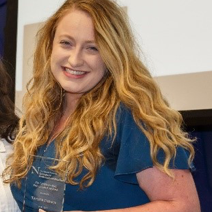
Winner: Taylor Faraca
Project Title: “Therapeutic Hunting and Its Success” Working with the company Homeplace Ministries
About the Project: Taylor’s project entailed assisting HomePlace Ministries with their veteran and wounded soldier rehabilitation projects. She specifically assisted in the implementation of an emotional therapy program to assist veterans who were suffering from mental health and anxiety issues as a result of exposure to toxic fumes from burn pit vapor. Emotional therapy also has proven applicable to veterans and soldiers dealing with survivors’ guilt.
Humanics Award
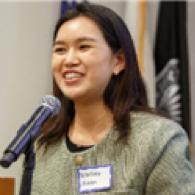
Winner: Rebekah Duan
Experiential Learning Information: Rebekah has engaged with multiple experiential learning projects and experiences during her time at Northeastern, helping to manage two student-run websites (Husky Communications and Inspire & Influence). She is the president of a graduate student group called Husky Communicators, which focus on website and social media management, event planning, and writing on campus. She also has contributed to an XN team developing a public relations plan for a nonprofit company- Universal Promise.
Co-op Excellence Award
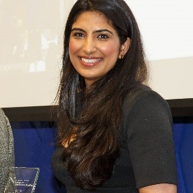
Winner: Nidhisha Bhalla
Co-op: Regulatory Affairs Associate for Neuro Spinal Innovation Inc.
About the Co-op: The purpose of the Regulatory Affairs co-op was to assist in the preparations and filing demands for regulatory approvals of the products of NSI as it pertains to the overall goal of Neuro Spinal Innovation Inc. The candidate had the opportunity to experience various global regulations by providing support on different projects.
The Dean’s Medal for Outstanding Doctoral Work
The Dean’s Medal for Outstanding Doctoral Work is the highest honor awarded by the College to a doctoral graduate. It was established to acknowledge exemplary academic achievement and to recognize demonstrated creativity. The process for determining one or more recipients involves evaluating the nominated candidate’s thesis dissertations based on the following criteria: the degree of comprehension, innovation, and creativity; the scope and importance of the work to a field of study; and the caliber of writing.
This year CPS will honor three Dean’s Medal recipients at the Doctoral Hooding Ceremony in Boston on Thursday, May 11.
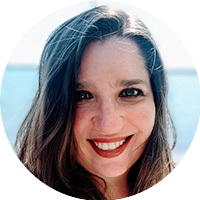
Katie Spencer White, DLP
Thesis Dissertation: Equal Justice Under Law: Eviction Reform and the Experience of Justice for Pro Se Defendant Tenants
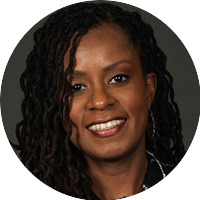
Katonja Webb Walker, EdD
Thesis Dissertation: “I Need People”: Mentoring as a Strategy to Support Black Doctoral Student Success
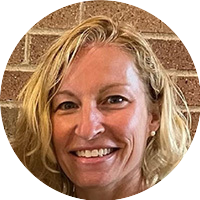
Stacie B. Simko, DPT
Thesis Dissertation: Physical Therapy for Students with Autism: Survey of School-Based Physical Therapists
Congratulations to this year’s winners — they truly embody the mission of CPS to push boundaries and expand academic work across relevant and important disciplines.
At every academic degree level – bachelor’s, master’s, and doctoral – students from our College were recognized this year for their extraordinary achievements and commitment to the values of Northeastern University. These learners epitomize what makes us so proud of our CPS students. Congratulations to all our 2023 award winners!